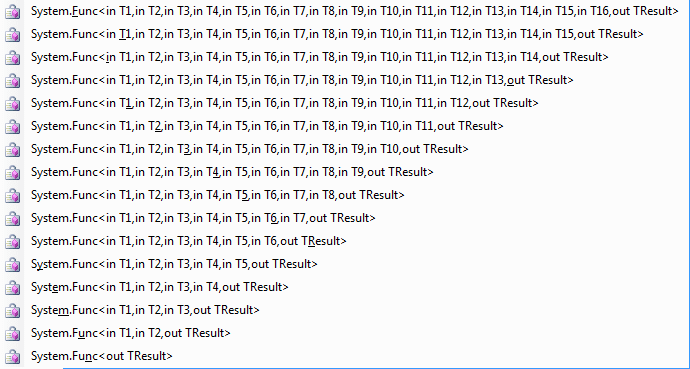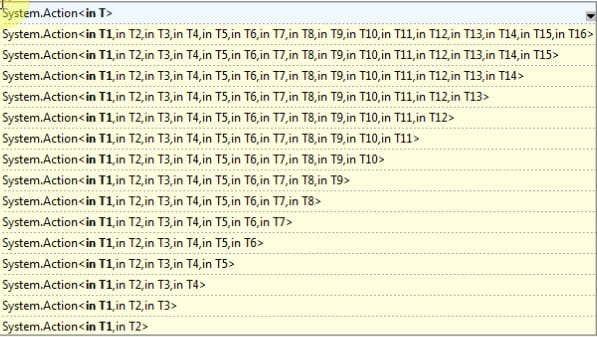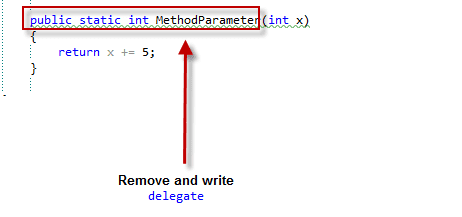Finally I decide to post this topic, every time I said it's not needed because it's very simple topic, but I always take time to remember all it's details specially when i get busy with TFS workflow, build automation, deployment automation and all other process automation stuff, when I get back to C# code I take time to remember these small things, so I decide to post it to be remembered quickly
- Func<>
I will start by talking about [Func]<> so what is it? Built-in delegates that take none or one or many parameters and return one result, as we can see we have 16 overloading start from the first one that didn't take any parameters and return one result and ending with the final one that take 15 parameters and return one result too
Remember that always the last parameter is the return parameter Why these delegates exist? because .NET Framework use them in LINQ and Extension method so Microsoft makes them public so that we as developers can use them instead of creating new delegates with the same signature
- Action<>
The same as Func but it doesn't return value (void)
- Lambda Expression
So let's see the following example:
1
2
3
4
5
public static int MyMethod(Func<int, int> del)
{
return del(4);
}
So we can see that this method takes a parameter as delegate, that's mean we will pass a method as a parameter with the same signature of the delegate So we can make method that take one [int] and return [int] as the signature of the Func as the following method
1
2
3
4
5
public static int MethodParameter(int x)
{
return x += 5;
}
And then we will path it to our method (MyMethod)
1
MyMethod(MethodParameter)
But why we create method that we will not use it anymore??? And here the anonymous method will take place, so instead of creating method and pass it to MyMethod we will pass anonymous method with the same signature So how to write anonymous method with the same signature? it's very simple, we just write the method and remove the first part until the parameter and write delegate instead of the first part as the following:
So it will become as the following:
1
2
3
4
5
Func<int, int> myDelegate = delegate(int x)
{
return x += 5;
};
So now we can pass the anonymous method to MyMethod as the following:
1
2
3
4
5
MyMethod(delegate(int x)
{
return x += 5;
});
So now we will convert the anonymous method to lambda expression and pass it to MyMethod but first how we can convert anonymous method to lambda expression? It's very simple
1
2
3
4
5
6
7
8
9
10
11
12
13
14
15
16
17
18
19
20
21
// anonymous method
MyMethod(delegate(int x)
{
return x += 5;
});
// lambda expression with explicit parameter type
MyMethod((int x) =>
{
return x += 5;
});
// lambda expression with inferred parameter type
MyMethod(x =>
{
return x += 5;
});
// simplified lambda expression (single statement, no curly braces needed)
MyMethod(x => x += 5);
So now instead of pass anonymous method to MyMethod we will pass the lambda expression of the anonymous method as the following:
1
2
MyMethod(x => x += 5);
We don't need to express the logic of our delegate in the lambda expression. We can as easily call a method, like this:
1
2
prod => EvaluateProduct(prod)
If we need a lambda expression for a delegate that has multiple parameters, we must wrap the parameters in parentheses, like this:
1
2
(prod, count) => prod.Price > 20 && count > 0
And finally, if we need logic in the lambda expression that requires more than one statement, we can do so by using braces ({}) and finishing with a return statement, like this:
1
2
3
4
5
6
7
8
(prod, count) =>
{
// ...multiple code statements
var result = prod.Price > 20 && count > 0;
return result;
// Notice here because multiple parameters we have Parentheses
// And also because we have many statements we have curly brackets
}
I hope it helps



